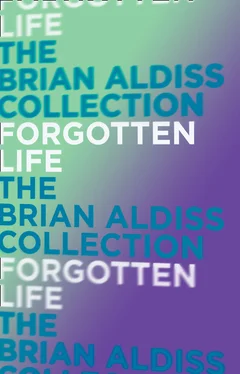‘Such as what, exactly? His unhappy childhood?’
‘That, too, I suppose. But I was thinking of an incident he once told me about. Maybe he told me twice. It was about something which had made a great impression on him. It took place outside Calcutta, and so it would have happened just before the first of these letters to Ellen. In any case, the incident was too horrific for him to wish to report it to a little sister.
‘The group he was in was led by the Sergeant Sutton he mentions in one of Ellen’s letters. After travelling across India from Bombay, they reached a transit camp somewhere on the outskirts of Calcutta. Joe gave me a vivid account of the squalor, and of seeing a water buffalo dying in the railway marshalling yards – shunting yards, we used to call them – surrounded by vultures, who set about tearing it to shreds while it still had life.
‘Owing to some confusion in the rail timetables, not uncommon in those days of crisis, with the Japanese army at the gates of India, Joe’s detachment had to leave their train and go to this camp somewhere nearby. It was just a collection of ragged tents beside a railway embankment, no signs of discipline or cleanliness anywhere. Full of flies and filth.
‘Joe and Sutton went to the office to apply for money to continue their journey to Burma. I suppose at that time the movement of troops would be towards the east only, across India to the war zone. He said it was like a peristaltic movement. Everyone was drawn into it. But he and Sutton found that this camp was full of deserters, who had got that far and then jumped off trains at Calcutta, rather than face the Japanese. Deserters ran the camp. There was nowhere they could go – they certainly couldn’t make it back to England. So they stayed put, waiting for the war to finish. If the camp was inspected, the deserters simply melted into Calcutta, where no one could find them. They lived by making false returns to various legitimate units nearby. The money was spent on food, booze, and whores. The whores came into the camp – quite against army regulations, of course.’
He glanced out of the window again. ‘The old bitch next door is watering her tree once more. Anyhow, Joe and Co had to stay in the deserters’ camp that night. The camp was run by a renegade RSM, a Glasgow man, an alcoholic. He approached Sergeant Sutton, inviting him to stay there, since he wanted a sergeant under his command. Joe thought there was some talk of a drug racket, I don’t know what.
‘They had a crisis in the camp. I’ve never told you this, have I? The RSM had an NCO with him who was severely ill from amoebic dysentery and complications. He died the night Joe was in the camp. The RSM sent a detail of four men out at midnight with storm lanterns to bury the body under a railway bridge, where it wouldn’t be discovered. They hadn’t got a padre for any kind of service, because all padres were officers, and an officer would have had them rounded up and shot.
‘Sergeant Sutton said to Joe and the others, while the burial was going on, “Do you want to stay here or go on to Burma?” All the detachment, fresh out from England, were profoundly shocked by what was happening. Of course, the idea of Burma was also not to be taken lightly. So Joe said to Sergeant Sutton, “What do you think, sarge?”
‘And the sergeant said, “I’d sooner be killed in battle than stay in this fucking sink of iniquity another night.” Next morning, they marched back to the Calcutta station – Howrah, I think it was called. They swore to the RSM that they would say nothing about the illegal camp, and of course they kept their word.
‘Joe derived a profound moral from that episode. I’ve always thought of him as very courageous – not heroic, I don’t mean, but courageous – and he probably saw the war itself as somehow cleaner or more honest than the fear which was the reason for the camp’s existence. He saw how easily men could deteriorate.’
Sheila had moved over to the window and was gazing out at the sunlit street.
‘It makes a good story. Terrifying. It would make a play. Did the RSM threaten them before letting them leave? With a gun, I mean?’
‘I don’t know about that.’
‘I think he’d have to. Burying the body at dead of night is a nice touch, but they could have left the body out for the vultures. Would that be a quicker way of disposing of the body?’
‘Sheila, this really happened.’
‘Yes, I know.’
When she had gone downstairs to get on with her own work, and he heard her typewriter tapping in the room below his, he thought of how her mind was at work on the story. It would probably surface, with added drama, in a future Kerinth novel. He merely wanted to strengthen the story, not add to it. He wanted it clear and as it had been, over forty years ago. Yet even he, telling it to Sheila, had added something. The bit about the whores coming into the camp seemed all too likely; but that had not been anything Joseph had told him. He remembered now that Joseph had said, in passing, that the deserters got fearfully drunk on palm wine every night, in order to escape from their miserable circumstances. Had he said palm wine? It was difficult to remember.
Precision was not the only function of memory.
All the untidy clutter of papers in his room came from Joseph’s flat in Acton. He had to get clear in his own mind his brother’s early years. Then he could make decisions on how to deploy the material.
He picked up from his desk a photograph he had taken a year before Joseph’s death, showing Joseph and Sheila walking together on Port Meadow. In the background was Joseph’s girl friend – his final girl friend – Lucy Traill.
Joseph was laughing, his mouth open, his face creased with humour. His tall, spare figure was leaning slightly forward. He liked to walk briskly. His hair, as always too long, was a streaky white and grey.
It was his wife’s features that Clement mainly studied. Because of the aspect of stillness in Sheila’s nature, she photographed well. Her broad face and well-defined nose and mouth were in evidence as she smiled at whatever the joke was. He thought, ‘No photograph can ever do her justice. Nor for that matter does my memory. I fail to set up a moving picture of her in my mind. That’s why I’m always eager to see her again, even if she has been out of the room for less than an hour. How I love that face! I couldn’t explain to anyone what it means to me, to see it every day.
‘I must be over-dependent on her. Why aren’t I more detached, as I am with others – with Arthur Stranks, for instance? Sheila would probably be shocked if she knew with what intensity I love her face and the woman. What a weakling I am! And she went to bed with that wretched little Hernandez …’
He was wasting time. To celebrate the publication of War Lord of Kerinth, he was arranging a party for Sheila in nine days’ time, on the Thursday of the following week. He made a few phone calls to local friends, inviting them to come. Then he returned to the question of his brother.
In Box File No. 2 lay a battered exercise book, in which Joseph had sought to retain some of his memories of the war years, in particular his time in Burma. The letters to his sister explained why Joseph had scarcely written home at all during the Burmese campaign. The censorship would not permit him to give a truthful account. And the censor already had an eye on Joseph. Joseph perhaps recalled Frederick the Great’s epigram that the common soldier had to fear his officer more than the enemy.
The battered exercise book was of Indian origin, bound in a coarsely woven cover. The narrative it contained was undated. The handwriting, in miscellaneous inks, some now badly faded, varied sufficiently for Clement to infer that the greater part of the account had been composed shortly after Joseph’s division had returned from Burma to India for rest and recuperation.
Читать дальше










